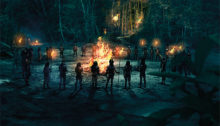 James Gray’s The Lost City of Z has moments that hearken back to any old Hollywood adventure epic – the grand journeys of yesteryear in which destination and discovery were the sole rewards. The music swells, the actors look stalwart, sly and in charge, and the scope widens to reveal a scenic vista worth many a venture.
James Gray’s The Lost City of Z has moments that hearken back to any old Hollywood adventure epic – the grand journeys of yesteryear in which destination and discovery were the sole rewards. The music swells, the actors look stalwart, sly and in charge, and the scope widens to reveal a scenic vista worth many a venture.
But, on this particular journey, things are big, and then they get small. The focus tightens. Things go poorly. The shine wears off, and the audience is reminded that, indeed, all that glitters is not gold.
The Lost City of Z, a dramatized look at explorer Percy Fawcett (Charlie Hunnam), functions as both grandiose gamut and intimate character study, using its subject as a walking, talking metaphor for the delights, dangers and downfalls of determined desire.
Spanning Fawcett’s life from his time as a young, brave journeyman to a seasoned explorer, the film spans big, but feels small. Gray, an auteur with experience in studio storytelling and more intimate cinema, knows how to mesh the scope of Fawcett’s life with the nuanced aim of his travels. He paints a varied, fair portrait of his subject, and gives the adventurer a lavishly-crafted vehicle to house his story.
Like many famous explorers of cinema lore, Fawcett uses his sheer force of will and hope of discovery as his guiding compass, venturing further and further into the austere Amazon with his rag-tag crew, seemingly teetering on the edge of a Heart of Darkness turn at any given moment. But, it never truly comes, making Fawcett a fascinating character to follow for the film’s lengthy runtime.
Wisely, Gray keeps Fawcett at arm’s length – he never establishes Fawcett as a totally noble explorer, nor does he outright condemn Fawcett’s obsession with finding what he calls “The Lost City of Zed,” which he believes to be the missing link to our understanding of humanity. More likely real-to-life, he suggests Fawcett is a flawed-yet-fine human – a man who understands what he’s giving up and what he’s putting at risk to achieve great things, but also one who shoulders the burden of what those decisions have cost him, and who loves those he’s leaving behind.
Fawcett is played by Hunnam, best known for his leading turns on FX biker drama Sons of Anarchy and Guillermo del Toro’s splendid kaiju/robot clash Pacific Rim. He delivers a career-best performance in the film, delivering a bountiful mix of intensity, focus and calm. It’s key that Gray has found an actor who can sell Fawcett with his presence as much as his pointed monologues (primarily given to dissenting voices who question the explorer’s intentions and findings). Hunnam possesses the kind of resolve needed to embody such a tight squeeze of a character.
Great actors could have struggled with this part, but it’s perfectly tailored to the best strengths Hunnam has as a performer. It’s a marvelous marriage, and is the primary reason The Lost City of Z is so spellbinding. You can’t imagine anyone else in the character’s boots.
Gray also get good work from his supporting cast. The always-reliable Sienna Miller plays a world-weary Nina, the long-suffering-yet-supporting wife of Fawcett. Robert Pattinson continues to separate himself from his sparkling vampire days in a fine turn as Fawcett’s right-hand man in the field. Tom Holland gets a few moments to shine as Fawcett’s son Jack. And Angus Macfadyen digs deep into a role that’s as close to a villain as anything in the film, the noted explorer James Murray, whose support of Fawcett’s missions dwindles once he gets his hands dirty in the field.
Gray’s pairing with cinematographer Darius Khondji supplies the yang to Hunnam’s ying. As vital as the lead performance is, the way the film looks is just as important to its survival. Khondiji filters his shots through cloudy, dream-like imagery, mixing beaming light in the moments of great discovery with the melancholy darkness of the jungle. It’s lensing not likely to be matched anytime soon, impressive in its composition and in its fusion with the narrative. In lockstep, Christopher Spelman’s score mixes tunes of triumph with notes of nauseating terror.
The Lost City of Z is a film about desire – the reckless kind of desire that, when laser-focused, can lead to any and all sorts of outcomes for those involved. Instead of lazily trying to tie the strings together, Gray hands them over to the audience, having them carefully thread their own portrait of Fawcett and his ventures with each passing frame.
Where that journey goes might just be as fascinating, and complicated, as the one on screen.

Comments
2 responses to “Review: James Gray’s ‘The Lost City of Z’”
Good review, Cory. I confess that I had never even heard of this film, but you make it sound worth a watch.
Best wishes, Pete.
Thanks, Pete!! It’s definitely worth seeing.